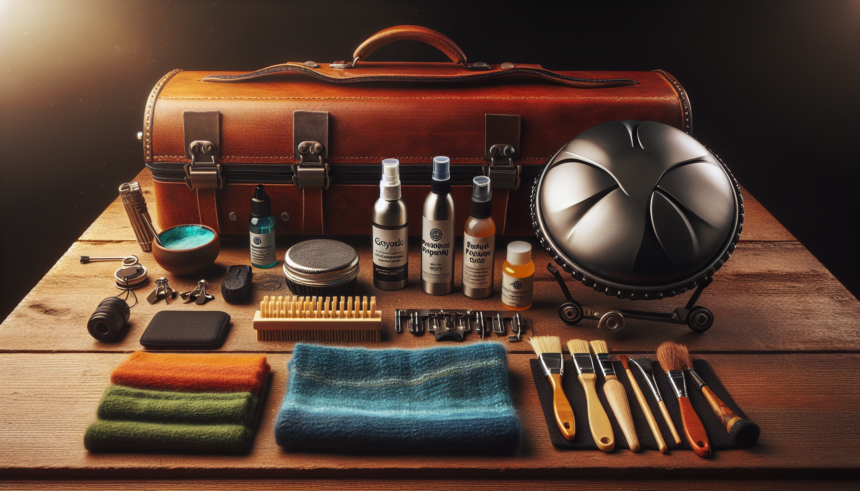<!DOCTYPE html>
<html lang="en">
<head>
<meta charset="UTF-8">
<meta name="viewport" content="width=device-width, initial-scale=1.0">
<title>Top Accessories to Include in Your Handpan Maintenance Kit</title>
<style>
body {
font-family: Arial, sans-serif;
line-height: 1.6;
padding: 20px;
max-width: 800px;
margin: auto;
}
h2 {
color: #2E86C1;
}
ul, ol {
margin: 10px 0;
padding-left: 20px;
}
</style>
</head>
<body>
<h2>Introduction</h2>
<p>The handpan is a unique and stunning musical instrument that provides ethereal sounds, mesmerizing musicians and audiences alike. Crafting such beautiful melodies necessitates taking good care of the instrument itself. Owning a handpan comes with the responsibility of ensuring that it remains in excellent condition for optimal performance and longevity. This is where a well-equipped maintenance kit comes into play. This article will detail the top accessories that every handpan owner should have in their maintenance kit, ensuring the instrument remains pristine, both in sound and appearance.</p>
<h2>1. Microfiber Cleaning Cloths</h2>
<p>A microfiber cloth is essential for maintaining your handpan. Its soft fibers are excellent at picking up dust and dirt without leaving scratches, ensuring your handpan's surface remains immaculate. Regular cleaning with a microfiber cloth can help prevent the build-up of oils and debris that can affect the tone and timbre of the instrument. After playing, gently wiping the handpan with this cloth removes any oils from your hands, helping in preserving the instrument's finish and tone.</p>
<h2>2. Handpan Cleaning Products</h2>
<p>Specific handpan cleaning products can be used to remove any residue that regular cloths can't handle. These solutions are formulated to clean without damaging the finish or metal. Always opt for products endorsed by the handpan community or manufacturers, ensuring they are free from harsh chemicals that could harm the instrument.</p>
<h2>3. Rust Inhibitors</h2>
<p>Handpans are typically made from nitrided steel, stainless steel, or other metal combinations, which can be susceptible to rust. Rust inhibitors, often in the form of oils or sprays, provide a thin protective barrier that guards against moisture. Applying a rust inhibitor after cleaning your handpan helps protect it from environmental factors that could promote corrosion. It's crucial to select a non-abrasive, acid-free rust inhibitor that won’t alter the sound of the handpan.</p>
<h2>4. Humidity Control Devices</h2>
<p>Moisture is the enemy of all musical instruments, and handpans are no exception. Humidity control devices, like silica gel packs or specially designed instrument humidifiers, help control the environment within your handpan's case. These devices absorb excess moisture, preventing rust and ensuring stability in the metal’s condition.</p>
<h2>5. Protective Carrying Case</h2>
<p>Protection during transport is just as essential as in-home care. A sturdy carrying case with ample padding and a snug fit helps protect your handpan from impacts and environmental conditions. Some cases may also feature compartments for carrying maintenance tools and accessories, making them perfect for musicians on the go.</p>
<h2>6. Gloves</h2>
<p>Gloves may seem like an unusual addition to a maintenance kit, but they're incredibly useful. Wearing gloves while handling the handpan, especially during cleaning and oiling, prevents oils and salts from your skin from transferring onto the instrument. This is especially helpful for those with naturally oily skin or anyone playing in humid environments.</p>
<h2>7. Tuning Device or App</h2>
<p>While tuning a handpan requires precision and experience, having a tuning device or app can be beneficial for regular checks. These devices can help you assess whether your handpan requires tuning by a professional, ensuring your music remains in perfect pitch.</p>
<h2>8. Maintenance Guidelines & Documentation</h2>
<p>Keeping a written or digital guide on handpan maintenance is beneficial for both new and experienced owners. This could include manufacturer guidelines, online resources, or tips from the handpan community. Having a reliable source of information helps ensure proper care and handling to maximize the life and sound quality of your handpan.</p>
<h2>9. Cleaning Brushes</h2>
<p>Small cleaning brushes can assist in hard-to-reach areas, especially around the dimples and edges of the handpan. Regular use ensures these areas are free from dust and debris that could affect the sound or lead to deterioration over time. Soft-bristle brushes are recommended to avoid scratching the surface of the instrument.</p>
<h2>10. Handpan Stand</h2>
<p>A sturdy handpan stand not only serves as a place to play but can also help with proper storage to keep the instrument safe from accidents. When not in use, storing your handpan on a stand reduces the risk of dents or scratches from being improperly placed on surfaces around your home or studio.</p>
<h2>Conclusion</h2>
<p>Maintaining your handpan is not only a matter of preserving its beauty but also ensuring its longevity and quality of sound. With a comprehensive maintenance kit filled with the essential accessories, a handpan owner can confidently take care of their instrument, ensuring it remains in perfect condition for years of musical enjoyment. While the handpan itself is an investment in musical artistry, an investment in maintenance is equally valuable for its preservation and continued performance.</p>
<h2>FAQs</h2>
<ul>
<li>
<strong>Q: How often should I clean my handpan?</strong>
<p>A: It's recommended to clean your handpan after each use to remove oils and dirt. A more thorough cleaning and application of rust inhibitors can be done monthly or as needed, depending on environmental conditions.</p>
</li>
<li>
<strong>Q: Can I use any cloth to clean my handpan?</strong>
<p>A: Microfiber cloths are recommended due to their softness and ability to pick up dust without scratching. Avoid using rough or abrasive materials that could damage the finish.</p>
</li>
<li>
<strong>Q: Is it necessary to use a rust inhibitor if I live in a dry climate?</strong>
<p>A: While rust inhibitors are especially important in humid environments, they can still be beneficial in dry climates as a precautionary measure to protect against any unexpected moisture exposure.</p>
</li>
<li>
<strong>Q: How can I tell if my handpan needs tuning?</strong>
<p>A: If you notice pitch changes, dissonance, or any buzzing sounds, it may be time to check the tuning. A tuning device or app can help you determine if professional tuning is needed.</p>
</li>
<li>
<strong>Q: What should I do if my handpan gets rusty?</strong>
<p>A: If rust appears, clean the affected area gently, treat it with a rust inhibitor, and seek professional advice if necessary. Preventative measures and regular maintenance can help avoid rust issues.</p>
</li>
</ul>
</body>
</html>Top Accessories to Include in Your Handpan Maintenance Kit

Leave a comment




